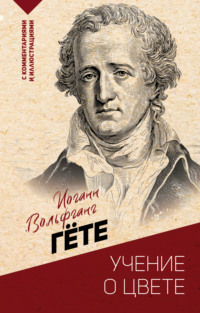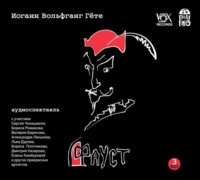 полная версия
полная версияThe Autobiography of Goethe
"You will not stay long with them!" was the close of all his remarks. On this occasion I remember a remarkable saying of his, which he repeated to me at a later time, which I had often repeated to myself, and frequently found confirmed in life. "Thy striving," said he, "thy unswerving effort is to give a poetic form to the real; others seek to give reality to the so-called poetic, to the imaginative, and of that nothing will ever come but stupid stuff." Whoever apprehends the immense difference between these two modes of action, whoever insists and acts upon this conviction, has reached the solution of a thousand other things.
Unhappily, before our party left Darmstadt, an incident happened which tended to verify beyond dispute the opinion of Merck.
Among the extravaganzas which grew out of the notion that we should try to transport ourselves into a state of nature, was that of bathing in public waters, in the open air; and our friends, after violating every other law of propriety, could not forego this additional unseemliness. Darmstadt, situated on a sandy plain, without running water, had, it appeared, a pond in the neighbourhood, of which I only heard on this occasion. My friends, who were hot by nature, and moreover kept continually heating themselves, sought refreshment in this pond. The sight of naked youths in the clear sunshine, might well seem something strange in this region; at all events scandal arose. Merck sharpened his conclusions, and I do not deny that I was glad to hasten our departure.
On the way to Mannheim, in spite of all good and noble feelings which we entertained in common, a certain difference in sentiment and conduct already exhibited itself. Leopold Stolberg told us with much of feeling and passion, that he had been forced to renounce a sincere attachment to a beautiful English lady, and on that account had undertaken so long a journey. When he received in return the sympathising confession that we too were not strangers to such experiences, then he gave vent without respect to the feelings of youth, declaring that nothing in the world could be compared with his passion, his sufferings, or with the beauty and amiability of his beloved. If by moderate observations we tried, as is proper among good companions, to bring him duly to qualify his assertion, it only made matters worse; and Count Haugwitz, as well as I, were inclined at last to let the matter drop. When we had reached Mannheim, we occupied pleasant chambers in a respectable hotel, and after our first dinner there during the dessert, at which the wine was not spared, Leopold challenged us to drink to the health of his fair one, which was done noisily enough. After the glasses were drained, he cried out: But now, out of goblets thus consecrated, no more drinking must be permitted; a second health would be a profanation; therefore, let us annihilate these vessels! and with these words he dashed the wine-glass against the wall behind him. The rest of us followed his example; and I imagined at the moment, that Merck pulled me by the collar.
But youth still retains this trait of childhood, that it harbors no malice against good companions; that its unsophisticated good nature may be brushed somewhat roughly indeed, to be sure, but cannot be permanently injured.
Klopstock.
The glasses thus proclaimed angelical had considerably swelled our reckoning, comforting ourselves, however, and determined to be merry, we hastened for Carlsruhe, there to enter a new circle, with all the confidence of youth and its freedom from care. There we found Klopstock, who still maintained, with dignity, his ancient authority over disciples who held him in reverence. I also gladly did homage to him, so that when bidden to his court with the others, I probably conducted myself tolerably well for a novice. One felt, too, in a certain manner called upon to be natural and sensible at the same time.
The reigning Margrave, highly honored among the German Sovereigns as one of their princely seniors, but more especially on account of the excellent aims of his government, was glad to converse about matters of political economy. The Margravine, active and well versed in the arts and various useful branches of knowledge, was also pleased by some graceful speeches to manifest a certain sympathy for us; for which we were duly grateful, though when at home we could not refrain from venting some severe remarks upon her miserable paper-manufactory, and the favor she showed to the piratical bookseller Macklot.
The circumstance, however, of importance for me, was, that the young duke of Saxe-Weimar had arrived here to enter into a formal matrimonial engagement with his noble bride, the princess Louisa of Hesse-Darmstadt; President von Moser had already arrived on the same business, in order to settle this important contract with the court-tutor Count Görtz, and fully to ratify it. My conversations with both the high personages were most friendly, and at the farewell audience, they both made me repeated assurances that it would be pleasant to them to see me at Weimar.
Some private conversations with Klopstock, won me by the friendliness they showed, and led me to use openness and candour with him. I communicated to him the latest scenes of Faust, which he seemed to approve of. Indeed, as I afterwards learned, he had spoken of them to others with marked commendation, a thing not usual with him, and expressed a wish to see the conclusion of the piece.
My Sister.
Our former rudeness, though sometimes as we called it, our genius-like demeanour, was kept, in something like a chaste restraint in Carlsruhe, which is decent and almost holy ground. I parted from my companions, as I had resolved to take a wide round and go to Emmendingen, where my brother-in-law was high bailiff. I looked upon this visit to my sister as a real trial. I knew that she had not a happy existence, while there was no cause to find fault with her, with her husband, or with circumstances. She was of a peculiar nature, of which it is difficult to speak; we will endeavour, however, to set down here whatever admits of being described.
A fine form was in her favor; but not so her features, which, although expressing clearly enough, goodness, intelligence, and sensibility, were nevertheless wanting in regularity and grace.
Add to this, that a high and strongly arched forehead, exposed still more by the abominable fashion of dressing the hair back on the head, contributed to leave a certain unpleasant impression, although it bore the best testimony to her moral and intellectual qualities. I can fancy, that if after the modern fashion, she had surrounded the upper part of her face with curls, and clothed her temples and cheeks with ringlets, she would have found herself more agreeable before the mirror, without fear of displeasing others as well as herself. Then there was the grave fault, that her skin was seldom clean, an evil which from her youth up, by some demoniacal fatality, was most sure to show itself on all festal occasions, and at concerts, balls, and other parties.
In spite of these drawbacks she gradually made her way, however, as her better and nobler qualities showed themselves more distinctly.
A firm character not easily controlled, a soul that sympathised and needed sympathy, a highly cultivated mind, fine acquirements and talents; some knowledge of languages and a ready pen – all these she possessed – so that if she had been more richly favored with outward charms, she would have been among the women most sought after in her day.
Besides all this there is one strange thing to be mentioned: there was not the slightest touch of sensual passion in her nature. She had grown up with me, and had no other wish than to continue and pass her life in this fraternal union. Since my return from the University we had been inseparable; with the most unreserved confidence we shared all our thoughts, feelings, and humors, and even the most incidental and passing impressions of every accidental circumstance. When I went to Wetzlar, the loneliness of the house without me seemed insupportable; my friend Schlosser, neither unknown nor repugnant to the good girl, stepped into my place. In him, unfortunately, the brotherly affection changed into a decided, and to judge from his strictly conscientious character, probably a first passion. Here there was found what people call as good a match as could be wished, and my sister, after having stedfastly rejected several good offers, but from insignificant men, whom she always had an aversion to, allowed herself to be, I may well say, talked into accepting him.
I must frankly confess that I have frequently indulged in fancies about my sister's destiny, I did not like to think of her as the mistress of a family, but rather as an Abbess, as the Lady Superior of some noble community. She possessed every requisite for such a high position, while she was wanting in all that the world deems indispensable in its members. Over feminine souls she always exercised an irresistible influence; young minds were gently attracted towards her, and she ruled them by the spirit of her inward superiority. As she had in common with me an universal tolerance for the good, the human, with all its eccentricities, provided they did not amount to perversity, there was mo need for seeking to conceal from her any idiosyncrasy which might mark any remarkable natural talents, or for its owner feeling any constraint in her presence; hence our parties, as we have seen before, were always varied, free, ingenuous, and sometimes perhaps bordering on boldness. My habit of forming intimacies with young ladies of a respectful and obliging nature, without allowing any closer engagement or relations to grow out of them, was mainly owing to my sister's influence over me. And now the sagacious reader, who is capable of reading into these lines what does not stand written in them, but is nevertheless implied, will be able to form some conception of the serious feelings with which I then set foot in Emmendingen.
But at my departure, after a short visit, a heavier load lay on my heart, for my sister had earnestly recommended not to say enjoined me, to break off my connection with Lili. She herself had suffered much from along-protracted engagement; Schlosser, with his spirit of rectitude, did not betroth himself to her, until he was sure of his appointment under the Grand Duke of Baden; indeed, if one would take it so, until he was actually appointed. The answer to his application, however, was delayed in an incredible manner. If I may express my conjecture on the matter, the brave Schlosser, able man of business as he was, was nevertheless on account of his downright integrity, desirable neither to the prince as a servant, immediately in contact with himself, nor to the minister, who still less liked to have so honest a coadjutor near to him. His expected and earnestly desired appointment at Carlsruhe was never filled up. But the delay was explained to me, when the place of Upper Bailiff in Emmendingen became vacant, and he was instantly selected for it. Thus an office of much dignity and profit was now intrusted to him, for which he had shown himself fully competent. It seemed entirely suited to his taste, his mode of action, to stand here alone to act according to his own conviction, and to be held responsible for everything, whether for praise or blame.
As no objections could be raised to his accepting this place, my sister had to follow him, not indeed to a Court-residence, as she had hoped, but to a place which must have seemed to her a solitude, a desert; to a dwelling, spacious to be sure, with an official dignity, and stately, but destitute of all chance of society. Some young ladies, with whom she had cultivated an early friendship, followed her there, and as the Gerock family was blessed with many daughters, these contrived to stay with her in turn, so that, in the midst of such privation, she always enjoyed the presence of at least one long-trusted friend.
These circumstances, these experiences, made her feel justified in recommending to me, most earnestly, a separation from Lili. She thought it hard to take such a young lady (of whom she had formed the highest opinion) out of the midst of a lively, if not splendid circle, and to shut her up in our old house, which, although very passable in its way, was not suited for the reception of distinguished society, sticking her, as it were, between a well-disposed, but unsociable, precise, and formal father, and a mother extremely active in her domestic matters, who, after the household business of the day was over would not like to be disturbed over some notable bit of work by a friendly conversation with forward and refined young girls. On the other hand, she in a lively manner set Lili's position before me; for, partly in my letters, partly in a confidential but impassioned conversation, I had told her everything to a hair.
Unfortunately her conception was only a circumstantial and well-meant completion of what a gossiping friend, in whom, by degrees, all confidence ceased to be placed, had contrived by mentioning a few characteristic traits to insinuate into her mind.
I could promise her nothing, although I was obliged to confess that she had convinced me. I went on with that enigmatic feeling in my heart, with which passion always nourishes itself; for the Child Cupid clings obstinately to the garment of Hope, even when she is preparing with long steps to flee away.
Schaffhausen – Zurich – Lavater.
The only thing between this place and Zurich which I now clearly remember, is the falls of the Rhine at Schaffhausen. A mighty cascade here gives the indication of the mountainous region which we designed to enter; where, each step becoming steeper and more difficult, we should have laboriously to clamber up the heights.
The view of the lake of Zurich, which we enjoyed from the gate of the "Sword," is still before me; I say from the gate of the tavern, for, without stopping to enter it, I hastened to Lavater. He gave me a cheerful and hearty reception, and was, I must confess, extremely gracious; confiding, considerate, kind, and elevating was his bearing, indeed, it would be impossible to expect anything else of him. His wife, with somewhat singular, but serene tenderly pious expression of countenance, fully harmonized, like everything else about him, with his way of thinking and living.
Our first, and perhaps only theme of conversation, was his system of Physiognomy. The first part of this remarkable work, was, if I mistake not, already printed, or, at least, near its completion. It might be said to be at once stamped with genius and yet empirical: methodical, but still in its instances incomplete and partial. I was strangly connected with it, Lavater wanted all the world for co-operators and sympathizers. During his travels up the Rhine, he had portraits taken of a great many distinguished men, in order to excite their personal interest in a work in which they were to appear. He proceeded in the same way with artists; he called upon every one to send him drawings for illustrations. The latter came, and many were not exactly suited for his purpose. So, too, he had copperplates engraved in all parts, which seldom tinned out characteristic copies. Much labor had been bestowed on his part; with money and exertions of all kinds an important work was now ready, and full honor was done to Physiognomy. But when in a great volume, illustrated by examples, Physiognomy, founded on doctrine, was to set up its claims to the dignity of science, it was found that not a single picture said what it ought to say; all the plates had to be censured or to be taken with exceptions, none to be praised, but only tolerated; many, indeed, were quite altered by the explanations. For me, who in all my studies sought a firm footing before I went further, I had now to perform one of the most painful tasks which industry could be set to. Let the reader judge. The manuscript, with impressions of the plates inserted was sent to me at Frankfort. I was authorized to strike out whatever displeased me, to change and put in what I liked. However I made a very moderate use of this liberty. In one instance he had introduced a long and violent piece of controversy against an unjust orator, which I left out, and substituted a cheerful poem about nature; for this he scolded me, but afterwards, when he had cooled down, approved of what I had done.
Whoever turns over the four volumes of Physiognomy, and (what he will not repent of) reads them, may conceive the interest there was in our interviews, during which, as most of the plates contained in it were already drawn and part of them had been engraved, we examined, and decided on those fit to be inserted in the work, and considered the ingenious means by which those, which did not exactly tally with its principles, might be made instructive and suitable.
Whenever at present I look through the work of Lavater, a strange comic, merry feeling comes over me; it seems as if I saw before me the shadows of men formerly known to me, over whom I once fretted, and in whom I find little satisfaction now.
The possibility, however, of retaining in some sort, much that otherwise would have been unsuitable, was owing to the fine and decided talent of the sketcher and engraver, Lips. He was, in fact, born for the free prosaic representation of the actual, which was precisely the thing wanted in this case. He worked under a singularly exacting physiognomist, and therefore was obliged to look sharp to approximate to the demands of his master; the clever peasant-boy felt the whole responsibility of working for a clerical gentleman from a city so highly privileged, and gave his best care to the business.
Living in a separate house from my companions, I became every day more of a stranger to them, without the least unpleasant feeling having arisen; our rural excursions were no longer made together, although in the city we still kept up some intercourse. With all the arrogance of young counts they had honored Lavater with a visit and appeared to the skilful physiognomist somewhat different from what they did to the rest of the world. He spoke to me about them, and I remember quite well, that, speaking of Leopold Stolberg, he exclaimed: "I know not what you all mean; he is a noble, excellent youth, and full of talent; but you have described him to me as a hero, as a Hercules, and I have never in my life seen a softer and more sensitive young man; nor, if need be, one more easily influenced. I am still far from having formed a clear physiognomical judgment of him, but as for you and all the rest, you are in a fog altogether."
Since Lavater's journey on the Lower Rhine, the public interest in him and his physiognomical studies had greatly increased; visitors of all sorts crowded upon him, so that he felt in some sort embarrassed at being looked upon as the first of spiritual and intellectual men, and the chief point of attraction for strangers. Hence, to avoid envy and all unpleasant feelings, he managed to remind and warn his visitors that they must treat other distinguished men with friendship and respect.
Visit to Bodmer.
In this especial regard was had to the aged Bodmer, and, accordingly, we were compelled to visit him and pay our youthful respects to him. He lived on a hill, above the large or old town, which lay on the right bank, where the lake contracts its waters into the Limmat. We crossed the old town, and, by a path that became steeper and steeper, at last ascended the height behind the walls, where, between the fortifications and the old wall, a pleasant suburb had sprang up, partly in continuous and partly in detached houses, with a half country look. The house where Bodmer had passed his whole life, stood in the midst of an open and cheerful neighbourhood, which, the day being beautiful and clear, we often paused on our road to survey with the greatest pleasure.
We were conducted up a flight of steps into a wainscoted chamber, where a brisk old man, of middle stature, came to meet us. He received us with his usual greeting to young visitors; telling us that we must consider it an act of courtesy on his part to have delayed so long his departure from this world in order that he might receive us kindly, form our acquaintance, refresh himself with our talents, and wish us joy in our future career.
We, on the other hand, congratulated him that, as a poet belonging to the patriarchal world, he had yet in the neighbourhood of the most highly cultivated city, possessed during his whole life a truly idyllic dwelling, and, in the high free air, had enjoyed for so many long years such a wide and beautiful prospect to feed his eyes with unfading delight.
It seemed anything but displeasing to the old man when we asked permission to take a view from his window of the neighbouring scenery; and truly the prospect in the cheerful sunshine, and in the best season of the year, appeared quite incomparable. The prospect commanded much of the slope, from the great town down to the water's edge, as well as the smaller town across the Limmat, and the whole of the fertile Sihl-feld, towards the west. Behind us, on the left, was a part of the lake of Zurich, with its bright rippled surface, and its shores endlessly varying with alternating hill and valley and height after height in greater variety than the eye could take in, which, dazzled by this splendour, delighted to rest on the blue range of the loftier mountains in the distance, whose snowy summits man has been so far intimate with as to give names to.
The rapture of us young men at sight of the marvellous beauty which, for so many years, had daily been before him, appeared to please the old poet; he became, so to speak, ironically sympathizing, and we parted the best of friends, but rot before a yearning for those blue mountain heights had taken possession of our souls.
Now I am on the point of leaving our worthy patriarch, I remark, for the first time, that I have as yet said nothing of his form and countenance, of his movements, and his carriage and bearing.
In general, I do not think it quite right for travellers to describe every distinguished man, whom they visit, as if they wanted to furnish materials for advertising a runaway. No one sufficiently considers that he has only looked at the great man during the moment of introduction, and then only in his own way; and that according to the circumstances of the moment the host may or not be what he seemed, proud or meek, silent and talkative, cheerful or morose. In this particular case, however, I may excuse myself from the attempt, by saying that no verbal description of Bodmer's venerable person would convey an adequate impression. Fortunately there exists a picture of him by Graff, of Bause, which perfectly represents the man as he appeared to us, and, indeed, exactly preserves his peculiar penetrating and reflective look.
Passavant – Lavater.
A great, not indeed unexpected, but still highly coveted gratification awaited me in Zurich, where I met my young friend, Passavant. Of a respectable family of the reformed persuasion, and born in my native city, he lived in Switzerland, at the fountain-head of the doctrine which he was afterwards to proclaim as a preacher. With a frame not large, but active, his face and his whole manner promised a quick and agreeable resoluteness of character. His hair and beard were black, his eyes lively. On the whole, you saw in him a man of some sensitiveness, but of moderate energy.
Scarcely had we embraced one another and exchanged the first greeting, when he immediately proposed to me to visit the smaller cantons. Having himself already walked through them with great delight, he wished, with the sight of them, to awaken my rapture and enthusiasm.
While I was talking over, with Lavater, the most interesting and important points of our common business, until we had nearly exhausted them, my lively fellow-travellers had already sallied forth in various directions, and, in their own fashion, had examined the country. Passavant, receiving and welcoming me with hearty friendship, believed that he had gained thereby a right to the exclusive possession of my society, and, therefore, in the absence of my companions, contrived to entice me to the mountains, the more easily, since I was decidedly inclined to accomplish the long desired ramble in quiet and at liberty to follow my own whims. Without further deliberation, therefore, we stepped into a boat and sailed up the glorious lake, on a fine clear morning.









